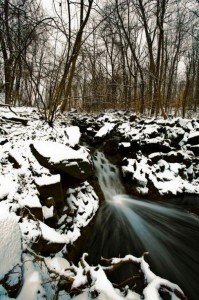Four Ways to Reduce Winter Stormwater Pollution
Controlling stormwater pollution is a year-round concern, one that matters in winter just as much as spring and summer. When the temperature drops, vast amounts of deicing chemicals are dumped by the truckload across our roads, sidewalks, and driveways. With each thaw, all that salt washes directly into our waterways. Freezing temperatures also lead to broken pipes, which can lead to erosion issues or even raw sewage pouring into our streams.

- Avoid using sodium chloride as a deicer. In Baltimore City, many streams already exceed the chloride threshold of 0.25 grams per liter for harming sensitive freshwater life. Chloride levels in some streams can reach nearly 5 grams per liter, which is one-fourth as salty as seawater (Kaushal et al. 2005). Commonly used road salts like sodium chloride (also known as halite) can kill plants, break down concrete, and stain carpets. More environmentally friendly alternatives to sodium chloride are acetates (such as Premiere Ice Melter), potassium chloride, or magnesium chloride (such as SafeStep Mag Chloride 8300).
- Open your rain barrel spigot. Though this doesn’t help with stormwater in the winter, it does help prevent your barrel from filling with ice and potentially cracking. A cracked barrel definitely can’t reduce stormwater pollution!
- Do not pile snow on your rain garden. Though your plants are dormant, heavy snow loads, upon melting, could saturate your garden for long enough to potentially hurt your plants. Normal snow accumulation does not pose a problem, though, so there is no need to shovel the garden! Pile your snow from elsewhere on the uphill side of the rain garden instead so that when it melts your rain garden can do its thing.
- Go pervious! Replacing your walkway or driveway with river stone, pervious pavers, or other porous materials will allow water to soak into the ground instead of becoming runoff. These surfaces not only help reduce polluted stormwater runoff and erosion, they also “breathe” more than impervious surfaces like asphalt and concrete, so they take longer to ice over.
Also, it’s not too early to think about your spring stormwater footprint, either. Sign up for our FREE homeowner Water Audit and let us advise you on the many many no-cost and low-cost techniques – such as downspout disconnection, rain barrels, or rain gardens – you can employ to reduce polluted runoff from your property. And if you have already reduced your stormwater runoff, consider passing our brochure along to a friend or neighbor!

